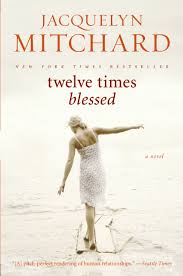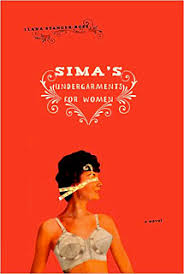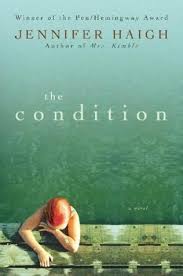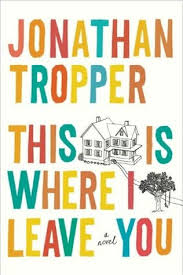
In typical Marnes and Noble fashion, I sat in Borders (sorry BandN!) reading
Commencement the day it came out (I am currently on vacation so I have way too much free time!) I was a hundred and fifteen pages in when I had to leave the store so I bought the book. I of course finished it in one day - the day of its publication. Such typical MandN behavior. A day later, I am still thinking about so many of the issues this book offers insight on. I guess since I am a twenty-something who is still trying to figure so much out, and I am deeply attached to my college group of friends this book deeply resonated with me.
I was very excited for this book since I consider it to be the same genre as A Fortunate Age. One of my friends didn't love A Fortunate Age. I understand her criticisms but I happily devoured Smith-Rakoff's book. My first thought when finishing it was that I wanted to read it again. Part of my love may come from its focus on NYC in the 1990s. In many ways, NYC was a character in the book. And I miss NYC dearly.
As for Commencement: to me this is a genre I treasure. The story of a group of friends post-college. It is a time period I have wanted to capture myself and I suppose I still hope to someday. It is hard to read Commencement and not feel nostalgic for college, especially since I have entered somewhat of a quarter life crisis in my twenty fifth year. Interestingly, both Commencement and A Fortunate Age focus on students who attend liberal arts colleges. Having attended an Ivy, I wonder how different my experiences and my career path would have been if I attended a small liberal art's college. I never really considered attending a liberals arts college; but I think I may have been happy at one. (Not that I didn't love my own college experience, as I did, thoroughly). In many ways the book focuses on how random events change individuals. If the four protagonists had not chosen to attend Smith, or been randomly placed in the same house (in the maid's quarters) they would have had completely different experiences. In one passage of the book, it is very obvious that Bree and her family recognizes that Smith forever altered her in ways that were unimaginable before hand. Sally, on the other hand, is most affected by the death of her mother right before her high school graduation. In many ways, the absence of her mother affects all of Sally's behaviors and decisions, and she realizes that much of what she had done since her mother's death was "an attempt to shock her back to life" (an affair with a married professor, not applying to medical school, her bare bones wedding in the Smith College Quad). (pg. 115) April's determined and extreme personality and hardcore feminism is a result of her tumultuous upbringing and the absence of supportive family and friends. Celia, on the other hand, is greatly affected by her large nurturing family, her supportive and successful mother, a rape experience and her unique view on men.
This book provided a clear window on the Smith experience and it had me nostalgic for my college's own traditions. But I also loved living through the four years of college with these interesting and disparate women. I found it particularly interesting to consider how attending an all-girls college affects hook up culture and women's perception of men. The book highlights (through a theory of Celia's) the idea that some "women's college grads are like people who had lived through the Depression -- even though they now had plenty of food, they still hoarded every last scrap." Celia explains: "when she met a guy, any guy, she was too willing to accept his flaws because who knew where her next meal was coming from?" (pg. 213) The book also offers such interesting views on feminism. Feminism is something that the girls clearly grappled with extensively at Smith. I am not sure I can say that I did the same during my four years of college. I took a Gender Studies class, and a Women's history course, I worked for a group that promoted positive body image, a group that invited Naomi Wolf to speak on campus (and of course I was in the audience) and I participated in Take Back the Night Walks. But I still don't feel that feminism is something my friends understood or grappled with in college . At this point in our lives, we are certainly considering the idea of our choices and we obviously see that we have many more options than previous generations. But I can't say that any of my friends are feminists, or that they feel the most strongly about women's issues. It is something interesting to compare and contrast. The women at Smith clearly cared less about their appearances and experimented more with their sexuality. The culture at my college was much more materialistic and into appearances and the hook up culture was much more "heteronormative."
The inside book cover proclaims that this novel is "a portrait of the first generation of women who have all the opportunities in the world, but no clear idea what to choose." This is an interesting idea to consider. I suppose this is true of my friends and the people I grew up with, and I suppose I know many woman who havemade choices that seem archaic. Sullivan deftly portrays keen insight on our shared generation. She shows women who are interested in snatching a husband and others who don't believe they will ever find a man who compliments them. Celia, is in many ways a true modern woman, as she doesn't long for marriage and feels that she is a different version of herself (Celia 2.0) among men. I can remember feeling my female friends in college knew me best. There have only been a small group of men who have understood me in the same way. But the optimist in me does believe there is someone out there (and many somebodies at that) out there for everyone, even Celia.
Sullivan is quite insightful. So many of her ideas were things I had considered before but she packages them in creative new ways. She describes the girl's experiences their first year out of college as their freshman year, and each subsequent year as their sophomore, junior, senior year. I liked this idea greatly. There is so much uncertainty post college. Maybe our culture has infantilized young people, or maybe adolescence has been delayed or extended, but so much of post college life is challenging and unique. Even now, a full four years out of college, I am still trying to figure out what I want in life. In some ways, it is hard to read about the protagonists of this novel. They all seem so sure of their career choices: Bree is a lawyer and followed her dreamed path from Smith to Stanford; Celia wants to be a writer and she works in publishing while eventually making time to write on the side; April eventually works for a radical feminist, partaking in crazy experiences, but acting out of a deep passion for her work; Sally, may have given up on her dream to go to med school but she is still connected to the science world, working in a lab at Harvard. Sally also seems content to build a new family for herself with her doting husband Jake. She is certain in that decision, even if she recognizes that she has given up on some of her initial dreams. The truth is they all do stumble, being surprised by unexpected events, making spontaneously bad and good decisions. But I was envious of how much each of them had a sense of certainty about what they wanted.
I love the insights and observations Sullivan shares about women in New York City. Her passage about the fact that most of the women looking for husbands worked in marketing had me laughing and nodding my head in agreement. Her discussion of dating in New York is filled with colorful characters like Barrel Daryl. All single women in NYC have some similar stories; Sullivan's don't disappoint.
I really have so much to say about this book. I found it interesting the way Sullivan discusses the young women's dependancy on their parents and the idea that all of them are supported somewhat by their parents but do not discuss it. Sally, has received money due to her mother's death (malpractice suit) and yet lives a pretty typical life - which is interesting but realistic. I am still grappling with the ending which didn't provide as much closure as I wanted (I turned the last page dreading seeing the Acknowledgements, knowing there was no more but wishing otherwise). I was easily drawn into this novel. I love the characters - I loved the way the friends are shown to be family to one another, the way they mothered one another. I can remember that about college: the way friends replace your parents as the people you call during big and small events.
I have some additional thoughts about the surprises in the end but I don't want to ruin the ending for people who want to read the book. I thought the book was going to go in one direction that made me amused in its similarity to A Fortunate Age, but it actually changed course. In reality, there are some amusing similarities. Both books focus on the first engagement and wedding of one of the friends. What does this say about life as a twenty-something post college? In A Fortunate Age, there is discussion of the fact that it is hard when your first friend becomes married because there is a sense that you are losing something, that your group of friends is changing. I am intrigued by this idea. In Commencement, the girls at first don't think Jake is smart enough for Sally. But in the end, it is obvious that he loves Sally and deeply appreciates the same thing that Sally's girlfriends love about her. He takes care of her and helps her to remember her mother, something her own family does not do. In the end he proves himself to the girls and thus, he becomes a "Smithie." A Fortunate Age spans a longer time period (and takes place in an earlier time period) and so by the end of the book almost all of the main characters are married with children. It is a natural progression I suppose. But it is interesting to consider. The first friend married in my group of college friends was a male and thus the effect was not the same. The first married girls, married individuals from our group, boys they dated throughout college and thus there was less a sense of loss, less a sense of altering the dynamics of the group. All of this is interesting to consider.
So much to ponder. I need my college friends to read this book so we can discuss!












